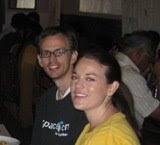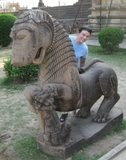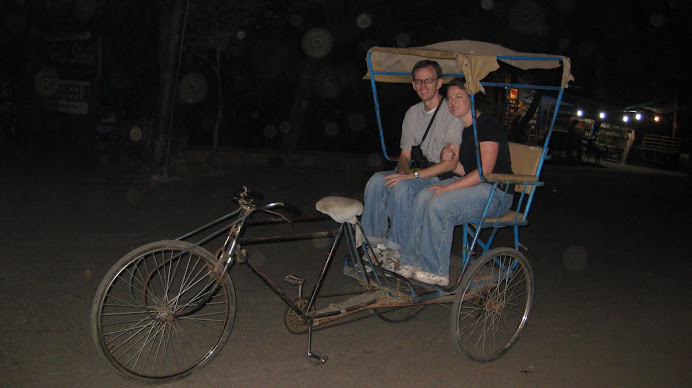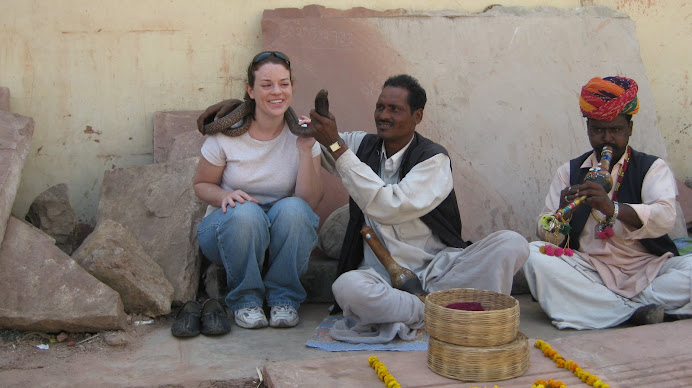Hi everyone, it's Kevin here writing on Amy's blog. So, I had an interesting conversation with a co-worker the other day that reminded me of why it is so difficult to communicate with the people here. I have been trying to figure out if there is a "language barrier" of some sort because most conversations are very similar to the one I am about to share and they cause me to be very confused when talking with Indians. We have the same foundation of English and even though they speak more British English, I don't believe this is the barrier since I have no problem communicating with a British professor that is here. So, maybe it's a cultural barrier and I say things and understand things from a different perspective? After pondering this hypothesis, I realized that most of the conversations I have with other Indians are not really related to cultural differences (at least that I can tell), so I've ruled out that as well. I still remain very confused as to what is the root cause of this communication barrier because it happens so often that often times I find it discouraging to even try to start a conversation with other people because it will end with me being more confused than when I started. So...here's how the conversation went (I'll post other conversations of this sort as they occur):
Background: It was about 8pm and my co-worker was leaving to eat dinner (Indians eat pretty late here), so I decided I would leave as well to eat dinner.
Indian: "well, I'm leaving to eat dinner."
Kevin: "Oh, ok. That sounds like a good idea, I think I'll go too."
Indian: "So, you haven't had your dinner yet? (because they know that I usually eat earlier around 7pm)
Kevin: "No, I haven't eaten yet."
Indian: "So, then what do you bring in that plastic container?" (because I have started to bring a small tupperware container to work that holds 2-3 sandwiches)
Kevin: "That was my lunch."
Indian: "What do you eat for lunch?"
Kevin: "I bring sandwiches."
Indian: "Really! You buy them on campus?"
Kevin: "No, I make them in our room."
Indian: "What? How do you make the bread?"
Kevin: "I don't make the bread, we buy the bread."
Indian: "Where do you buy the stuff to make the bread?"
Kevin: "No,no. We buy the bread, and the stuff to put on the bread at the central shopping area (on campus)"
Indian: "So you have plain sandwich?"
Kevin: "No, it's a peanut-butter and honey sandwich."
Indian: "So, then how do you make the bread?"
Kevin: "No, we BUY the bread and the peanut-butter and the honey and MAKE the sandwiches in our room."
Indian: "You don't have an oven in room? How do you make the bread?"
Kevin: "No, we don't MAKE the bread. We BUY the bread in a loaf at the store and make the SANDWICHES in our room."
Indian: "So, it's a plain sandwich?"
Kevin: "Sure, it's a plain sandwich." (said with exasperation because I was exhausted with the whole conversation)
So, I have recited this conversation over and over again to myself and to Amy and we still have no idea what he was talking about. We even went out on a limb and thought he was being sarcastic or just pulling my leg, but that is WAAAY out on a limb because we have never met an Indian that understands or can pull-off sarcasm or joking around like that. We both think he was seriously asking me something about my sandwiches (but we're not sure what?)
Does anyone know what a "plain sandwich" is?
Sunday, April 5, 2009
Subscribe to:
Post Comments (Atom)





































that is hilarious. i think by plain sandwich he means just bread with nothing in the middle?
ReplyDeleteoh yeah, its holly btw =]
Do the Brits use the word "buy" or "acquire". It seems that the word "buy" wasn't quite registering. I laughed heartily.
ReplyDeleteAnd the relationship between buying bread and plain sandwiches seems very clear. I believe that a plain sandwich is one made with purchased bread. If you don't have a plain sandwich then you made the bread yourself. Apparently...
Perhaps the mistake was saying you "made" sandwiches. Perhaps you should have indicated that you assemble them from pre-manufactured components (like the bread).